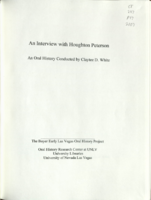Search the Special Collections and Archives Portal
Search Results

Transcript of interview with Midge Innis by James Thomas Griffin, May 8, 1976
Date
Archival Collection
Description
On May 8, 1976, James Thomas Griffin interviewed former casino dealer Midge Innis (born September 23rd, 1928 in Neligh, Nebraska) in her apartment in Las Vegas, Nevada about her life in Southern Nevada. The two discuss her occupational history as well as how she met her husband. The interview concludes Innis’ thoughts on environmental and social shifts in Las Vegas.
Text

Transcript of interview with Mary Cooke by Gigi Arino, March 18, 1978
Date
Archival Collection
Description
On March 18, 1978, Gigi Arino interviewed antique shop owner, Mary B. Cooke (born November 13th, 1936 in Watertown, Wisconsin) in her antique shop in Las Vegas, Nevada. During this interview Mary discusses previous jobs, personal family history, education, and the growth and development of the city. She also expresses her opinions on the topic of welfare, healthcare and the condition of the hospitals in Las Vegas.
Text

Transcript of interview with Clark Crocker by Monica Lehman, March 3, 1978
Date
Archival Collection
Description
On March 3, 1978, Monica Lehman interviewed Clark Crocker (born 1920 in Westfield, Massachusetts) about his experiences while living in Nevada. Crocker first talks about his family and educational background before describing his experiences from going to school in both California and Massachusetts. Crocker then describes what he knows about the building of Hoover Dam and later talks about his career as a teacher and school principal. The two also discuss Crocker’s hobbies and volunteer work, including that for the fire department in Pahrump, and they later discuss Crocker’s experiences as both a frogman and navigator for the United States Navy during World War II. The interview concludes with some of Crocker’s thoughts and philosophies on how curriculum should be structured in schools.
Text

Transcript of interview with Houghton Hoot Peterson by Claytee White, May 20, 2010
Date
Archival Collection
Description
Houghton Hoot Peterson played trombone in his high school band in northern Minnesota where he grew up. That same instrument would lead him to be a member of the highly regarded Air Force jazz band called Airmen of Note after enlistment. Then during a short tour at Nellis Air Force base, Hoot decided that the Las Vegas entertainment scene might have career opportunities for him. He moved to Las Vegas in 1962, an era of celebrity performers and tourists who enjoyed the crowds and nightlife. Hoot's point of view was as a musician in the band, most often a Strip relief band. But he also has tales of famous musicians and late night jam sessions. Hoot's career spanned 20 years. Eventually the Las Vegas scene for live musicians began to change. When times got tough for Hoot, he worked as a carpenter and at a music store. In this interview he discusses his fascinating past and offers advice for today's musicians.
Text

Transcript of interview with Lt. Harry Fagel by Barbara Tabach, April 15, 2016 and January 13, 2017
Date
Archival Collection
Description
In the signature line of Harry Fagel?s emails is a reads: Be the light in dark spaces. This illumines the person that Harry is both as a police officer and a poet in Las Vegas. Harry is native Las Vegan, who has served the community with the Las Vegas Metropolitan Police Department for nearly 30 years. He currently is a police lieutenant serving in Laughlin, Nevada. In addition, Fagel is a respected poet, writing both for the public and on commission. He performs in the local poetry scene. He also has showcased his poetry in two published books, released an album, and is a recipient of the Hilliard Endowment Grant from the University Nevada, Reno. Fagel is a graduate of the University of Nevada, Las Vegas, and currently lives in Henderson with his wife, Leilani and two sons, Sam and Jake. In this interview, Fagel discusses his family background, how his grandparents came to live in Las Vegas in the 1950s, as well as his relationships with both his mother and father. He recalls his early jobs which included working for his cousin Freddie Glusman?s restaurant Piero?s and for Circus Circus-long before becoming a policeman. His involvement with the Jewish community started young and he shares how it has evolved over the decades. In addition, Fagel reflects upon his career as a law enforcement officer, the progressiveness of the Las Vegas Metropolitan Police Department, and changes in relations between the police and communities, both locally and nationally. Lastly, Fagel talks in detail about his poetry, its dominant themes, and the local poetry scene.
Text

Transcript of interview with Robert Brown by Ian McLaughlin, February 23, 1981
Date
Archival Collection
Description
Text

Jean Sherman McColl interview, March 1, 1977: transcript
Date
Description
On March 1, 1977, collector Sam C. Melchiome Jr. interviewed Jean McColl (born May 24th, 1931 in California) at her home in Las Vegas, Nevada. In this interview, Jean McColl discusses growing up in Searchlight and then Las Vegas, Nevada. She discusses how her family came here as well as the many changes she has seen through the decades living in Las Vegas, Nevada.
Text

Rosamond McDougal interview, February 14, 1979: transcript
Date
Archival Collection
Description
On February 14, 1979, Concepcion Fernandez interviewed Rosamond McDougal (born in Texas) about her life as a teacher in Las Vegas. McDougal speaks primarily about her time as a teacher in the Clark County School District, her unique class setup and the district’s changes. Moreover, McDougal speaks about the growing number of students and teachers, the superintendent’s role in bond issues, the courses offered, racial integration in the school district (and the casinos), and the building of the University of Nevada, Las Vegas. McDougal gives personal anecdotes about her family, her husband’s job at the Atomic Test Site and her time as an organ player in churches around the city. Lastly, she talks about recreational activities, Helldorado, the casinos and department stores.
Text

Interview with Richard Van Nutley, November 8, 2004
Date
Archival Collection
Description
Text

Interview with James Arnold Hodges, January 17, 2005
Date
Archival Collection
Description
Text
